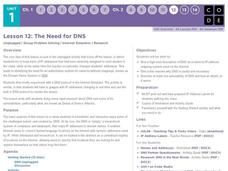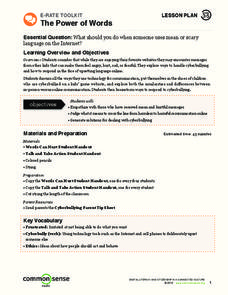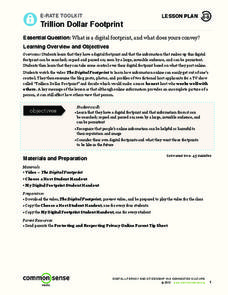Google
Be Internet Awesome
Teach the qualities of a digitally smart citizen with a set of lesson plans created by Google. Along with creating strong passwords, learners explore how to protect their privacy, when to stand up for others against cyberbullying, and...
Common Sense Media
Digital Compass
Time to make some real world decisions in an interactive digital citizenship game. Choose a story and help the characters make the right decisions regarding Internet safety, cyberbullying, copyright, media literacy, appropriate online...
Google
Interland
"Be Internet Awesome" is the motto in a super cool digital citizenship interactive created by Google. Interland is made up of four lands that explore the importance of digital safety and helps young Internet users to be alert, strong,...
Code.org
The Need for DNS
That's one complicated address book! To understand the need for a system that keeps track of addresses, pupils trying to find the IP address of their classmates. Then individuals change their IP addresses, which leads to research about...
Common Sense Media
Sending Email
Youngsters are introduced to the idea of communicating through e-mail, and gain important foundational knowledge for how to interact safely online.
Common Sense Media
The Power of Words
Give youngsters the tools to approach cyberbullying and hostile language on the Internet. This lesson plan includes a variety of handouts and worksheets that will prompt discussion and inquiry with your class members around harmful...
Common Sense Media
Talking Safely Online
What is the difference between online and real-life friendships? Pupils learn how to keep information private online and maintain their safety in various situations requiring online communication.
Common Sense Media
Digital Citizenship Pledge
Learners collaborate to create a set of group norms and expectations by which they will abide in order to promote a safe, respectful online community.
Common Sense Media
Private Today, Public Tomorrow
What responsibility do we have to protect the privacy and safety of others when posting information about them online? This is an essential lesson for every learner today experiencing their social and professional worlds in an online...
Common Sense Media
Cyberbullying: Crossing the Line
Teach pupils to identify different forms of cyberbullying, including harassment, deception, “flaming,” and threats to safety, as well as how to handle a situation in which cyberbullying might be involved.
Common Sense Media
Trillion Dollar Footprint
Learners explore their digital footprints, and discover how information they put online can easily be searched, copied, forwarded, and seen by a large audience.
Common Sense Media
Which Me Should I Be?
Impress upon learners the importance of considering how we identify ourselves online, and how this relates to overall considerations of safety and digital wellness.
Common Sense Media
Going Places Safely
How can places on the Internet be dangerous? Youngsters draw important connections between traveling online and staying safe in the real world. They also discover three key online safety rules to guide them throughout their online...
Anti-Defamation League
Dealing with the Social Pressures that Promote Online Cruelty
Why do people engage in cyberbullying? What can be done about it? These are the questions middle schoolers consider in a very timely lesson. Participants view PSA announcements, read a case study, and participate in scenarios designed to...
Anti-Defamation League
Cyberbullying and Online Cruelty: Challenging Social Norms
"Everybody does it!" is often the clarion call to justify cyberbullying. Here's a lesson plan that encourages high schoolers to challenge these behaviors. Participants examine images, watch videos, and engage in discussions designed to...
Anti-Defamation League
Building a Foundation for Safe and Kind Online Communication
Put a spotlight on internet safety with a lesson designed to boost positive online communication. Scholars listen to the story, Yettele's Feathers by Joan Rothenberg, and answer questions. An emoji-themed handout challenges pupils to...
Nebraska Department of Education
Writing Emails That Matter
LOL! BRB! :-) The rules for business and professional emails differ significantly from online communications among friends. As part of a career readiness study, pupils learn the do's and don'ts of writing professional emails.
Facing History and Ourselves
Identity and Choices
Timshel! Thou mayest! is the big idea in a lesson that reminds learners that they have choices about how they present themselves to others. To begin, individuals rate the degree to which the choices they make each morning are influenced...
Nemours KidsHealth
Online Safety: Grades 3-5
In two lessons all about online safety, scholars assist Nina in making smart decisions. First, they finish a speech started by the computer to detail why Nina's internet activity isn't safe and what she should do instead. Second,...
Health Smart Virginia
Socially Conscious Social Networking
A powerful, award-winning video launches a lesson about socially conscious social networking. After watching the video and engaging in a full class discussion, individuals share their ideas about healthy social networking in a podcast or...
Health Smart Virginia
Mental Health/Social Emotional Skills
Looking for social-emotional resources? Check out this seven-page packet that includes activity and lesson ideas, as well as links to information resources that support the social and emotional development of tenth graders.
Nemours KidsHealth
Online Safety: Grades 6-8
Recognize risky behaviors and avoid them! That's the big idea behind two activities designed to teach middle schoolers to think critically about online safety. After reading background articles about protecting online identity,...
Teaching Tolerance
The Privacy Paradox
What's more important: privacy or convenience? Scholars consider the question as they take a digital privacy quiz and read a transcript of an NPR podcast about the privacy paradox. As a culminating activity, pupils develop a list of five...
Teaching Tolerance
Civic Engagement and Communication as Digital Community Members
Don't feed the Internet trolls! Using a thought-provoking resource, pupils brainstorm a whole-class list of the possible kinds of bias young people may experience online. Next, in small groups, scholars create posters illustrating how to...

























